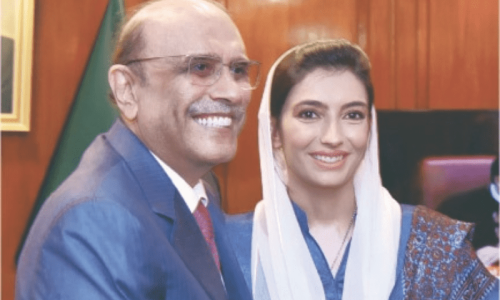
TOURISM has picked up ever since the volatile situation in the province has simmered down, and on Saturday, the maintenance staff of the Balochistan University of Information Technology, Engineering and Management Sciences (BUITEMS) in Quetta decided to hire a private bus, pack a picnic lunch and travel there for a relaxing getaway. The road to Bolan cuts a scenic swathe through breathtakingly beautiful mountains as the Bolan and Nari rivers snake through the area, making it the perfect spot for a picnic.
The bus had only just entered Dasht tehsil, after over half an hour of travelling, when it crashed into a van, leaving at least 15 dead and over 29 people injured.
“We had left Quetta city and entered the neighbouring Mastung district, when the accident took place,” says Mohammad Manzoor, one of the injured receiving treatment, alongside 10 others, at the Civil Hospital in Quetta.
The scene at the hospital was in complete contrast to the fairytale destination the BUITEMS staff had had in mind. There is a pattern to how events unfold here at the Civil Hospital following any tragic incident. Crowds of attendants, anxious to inquire after their loved ones, gather in front of the Trauma Centre, which they are not allowed to enter, because some government and local administration officials are there to meet the victims. Then there are the doctors at the Trauma Centre, who wax lyrical about the services provided to the injured, while the attendants complain about how they are not allowed to even meet relatives brought there for treatment.
Tales of late arrival of ambulances & plight of victims’ relatives at Quetta’s Civil Hospital repeated
Manzoor narrates the tragic turn of events that landed him at the hospital, but he doesn’t exactly know how the accident occurred, because he was in the backseat of the bus. “I couldn’t see the van or our bus driver at the time of the collision. But I felt and saw our bus turn over, and then I fainted,” he said.
He recalls: “We (the staff of BUITEMS) had been planning a picnic in Bolan for quite some time. We left today in the morning so that we could return to Quetta by the evening.” He explains that it was mostly the passengers in the front of the bus who had suffered the worst injuries, “our bus driver lost his legs”.
Journalists reported that the passengers in the van had received the most injuries. The van driver had been driving at high speed and lost control of the vehicle. “The van was tumbling and suddenly it came in front of the bus,” says Habibullah, who was sitting in the front row of the bus at the time of the accident.
Habibullah, like Manzoor, had fainted after the accident and lost a lot of blood.
While many relatives complained about how they were not allowed to inquire after their loved ones, Hassan, an attendant, managed to get permission. “They (doctors) shoo us away like cats, even though we are here to meet and ask after our relatives who have been injured.”
Dr Fahim Khan, the managing director of the Trauma Centre, does not agree. “We are doing our best to provide all kinds of health services to the injured. Those surgeons, who were not even on duty, have come to treat these people. They have conducted minor and big operations over here, which is why, out of the 30 people brought to here from Dasht, only one has succumbed to his injuries.”
Among those injured is Mohammad Anwar Shahwani, who had only just regained consciousness. In his low voice, he regrets that they were not rescued and brought to the hospital on time. “What a pity! After the accident occurred, I was trapped inside the bus and my head was hanging out of the bus window. I called for help and people from neighbouring areas gathered around to take photographs. They did not take us out of the bus. Finally, after an hour passed by, I was taken out [of the bus] by a crane.”
He added: “Instead of being taken to a hospital in ambulances, we were first brought to Quetta in the vehicles in which animals are transported...even the ambulances arrived late.”
Abdul Ghaffar, another ill-fated passenger, was travelling in the van with 10 of his cousins and close relatives. “Three of them are dead, and seven of them are badly injured.” He says that they were travelling to Quetta to look after his maternal uncle Qurban Ali, who had been injured in the terrorist attack at the shrine in Jhal Magsi a few days ago. “I have not yet told my maternal uncle about the tragic incident today.”
Published in Dawn, October 8th, 2017















































Dear visitor, the comments section is undergoing an overhaul and will return soon.